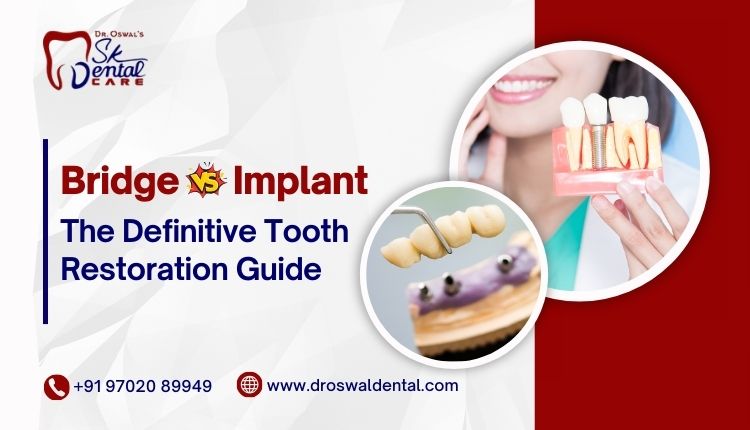Bridge Vs Implant: The Definitive Tooth Restoration Guide

Tooth loss can happen due to gum disease, injury, decay, or genetic diseases. A missing tooth should be replaced as soon as possible. The two most often used treatments for tooth restoration are dental bridges and dental implants. Although both methods are efficient solutions to replace missing teeth, they have certain advantages and disadvantages. So, how do you choose which tooth restoration treatment suits you best?
This guide presents a comparison between the two options to help you make a decision.
What is a Dental Bridge?
A dental bridge or fixed partial denture is used when a single tooth or multiple teeth in a row are missing. The bridge is cemented on the neighboring teeth on either side of the gap using artificial porcelain crowns. An artificial tooth known as a pontic fills the gap. The supporting teeth must be healthy and immobile to ensure the bridge's stability.
What is a Dental Implant?
A dental implant is a threaded titanium post surgically embedded into the bone socket of the missing tooth. Over time, the post fuses with the bone. Once the fusion is complete, a crown or denture is mounted on the post to restore the tooth. Implants are preferred when a single tooth or several teeth in different areas of the mouth need to be restored.
Bridge vs. Implant
Let us look at the key differences between a dental bridge and a dental implant.
1. Treatment Procedure
- To place a dental bridge, the adjacent teeth have to be filed down to accommodate the artificial crowns. While the procedure is relatively simple, altering the healthy neighboring teeth may cause some issues in the long term.
- Placing a dental implant is a highly invasive surgical procedure. The implant takes several months to heal. The process is long and complex, but the adjacent teeth are preserved. The results are longer lasting than those of bridges.
2. Cost of Treatment
- The initial cost of a dental bridge is relatively low, making it a viable option for those looking for a quicker tooth restoration solution. However, bridges need to be replaced more often, thus incurring a higher cost in the long run.
- Implants are more expensive upfront but are more durable and have several long-term benefits.
3. Aesthetics
- While both bridges and implants are customized to match the patient’s natural tooth color, implants more closely resemble natural teeth in looks and function.
4. Durability
- A dental bridge lasts an average of 5 to 15 years if properly maintained. The durability of a dental bridge also depends on the viability of the adjacent teeth.
- The titanium post of a dental implant has the potential to last a lifetime, and the crown can last for almost 10 to 15 years. Thus, dental implants are an excellent one-time investment.
5. Bone Health
- The biggest advantage of implants over bridges is that they contribute to maintaining the surrounding bone. The titanium post does the job of the tooth root, stimulating the bone and protecting it from degeneration.
6. Hygiene
- Dental bridges and implants have to be cleaned meticulously to maintain hygiene and increase durability. Implants are comparatively easy to clean. However, a dental bridge needs special care to protect the supporting teeth from decay.
You can choose between an implant and a bridge by considering the number and location of missing teeth, financial plan, and physical health. Speak with your dentist to make an informed decision that meets your requirements.
If you are looking for dental Implant treatment in Panvel, visit Dr. Oswal’s SK Dental Care Clinic today. For your flexible needs, we also offer crown & bridge treatment in Panvel.
